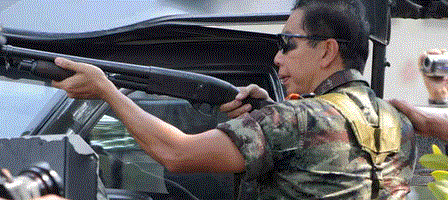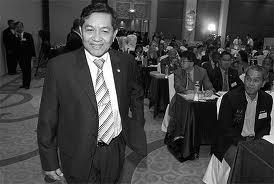The military junta has emphasized Thailand’s “uniqueness.” Thailand is probably the world’s only military dictatorship, it “protects” the monarchy more intensely than almost any other constitutional monarchy, its lese majeste law carries higher sentences than anywhere else and more.
It is probably not unique that it has officials and appointed members of assemblies who say some of the dumbest things that could possibly be imagined. They do this with straight faces, without a smile and appear to believe the daft things that flow from their mouths, seemingly disconnected from anything resembling a brain.
Likewise, we don’t think it is unique when the main “anti-corruption” bodies prefer to obfuscate, lie and cover-up for their bosses/friends/dictators.
But combining those “anti-corruption” bodies with officials saying the dumbest things may be unique.
As a case in point is Surasak Keereevichiena, a member of the National Anti-Corruption Commission reportedly stated that “[i]t is difficult for the nation’s anti-graft agency to conclude whether there was any wrongdoing in the Bt1.13-billion purchase of fake ‘remote substance detectors’…”.
That’s bad enough, but what was the reason for this outrageous claim? Get this: Surasak “said it was likely that officials had decided to purchase the devices because they believed the devices would work.” Making this dopey statement dopier still, he babbled that “[s]ometimes, it is not about the value of devices. It’s more about belief, just like when you buy Buddha amulets…”.
 Now what is Surasak prattling about? None other than the plastic handled scam wand, the GT200.
Now what is Surasak prattling about? None other than the plastic handled scam wand, the GT200.
Wikipedia’s page says this:
The GT200 is a fraudulent “remote substance detector” that was claimed by its manufacturer, UK-based Global Technical Ltd, to be able to detect, from a distance, various substances including explosives and drugs. The GT200 was sold to a number of countries for a cost of up to £22,000 per unit, but the device has been described as little more than “divining rods” which lack any scientific explanation for why they should work. After the similar ADE 651 was exposed as a fraud, the UK Government banned the export of such devices to Iraq and Afghanistan in January 2010 and warned foreign governments that the GT200 and ADE 651 are “wholly ineffective” at detecting bombs and explosives. The owner of Global Technical, Gary Bolton, was convicted on 26 July 2013 on two charges of fraud relating to the sale and manufacture of the GT200 and sentenced to seven years in prison.
For Thailand, where the prices paid reached the maximum, this story goes back beyond the early days of this blog. Our first post was in early January 2010, when General Pathomphong Kasornsuk reportedly wrote a letter to then Prime Minister Abhisit Vejjajiva to urge that a committee investigate the army’s procurement scheme for GT200 “bomb detectors.”
But the news reports of early 2010 point to an earlier purchase of the GT200, by the air force in 2004 or 2005. Wassana Nanuam, writing in the Bangkok Post (18 February 2010) says future 2006 coup leader ACM Chalit Phukpasuk was commander at the time. 2006 junta boss Gen Sonthi Boonyaratkalin, then army commander and chairman of the Council for National Security (CNS), was impressed with the device and it was used at that time by a unit which provided security for then prime minister Surayud Chulanont.
The Wikipedia page says this about Thailand:
The GT200 was used extensively in Thailand. Reportedly, some 818 GT200 units were procured by Thai public bodies since 2004. These include 535 bought by the Royal Thai Army for use combating the South Thailand insurgency and another 222 for use in other areas, 50 purchased by the Royal Thai Police for use in Police Region 4 (Khon Kaen), six bought by the Central Institute of Forensic Science, six by the Customs Department, four by the Royal Thai Air Force, and one by Chai Nat police. Other agencies such as the Border Patrol Police Bureau and the Office of the Narcotics Control Board use a similar device to detect drugs, the Alpha 6, procured from another company, Comstrac. According to the Bangkok Post, the Royal Thai Air Force first procured the GT200 to detect explosives and drugs at airports, followed by the army in 2006.[30] According to Lt Gen Daopong Rattansuwan, the Deputy Chief of Staff of the Royal Thai Army, each GT200 bought by the army cost 900,000 baht (£17,000/US$27,000), rising to 1.2 million baht (£22,000/US$36,000) if 21 “sensor cards” were included with it. In total, Thailand’s government and security forces have spent between 800–900 million baht (US$21 million) on the devices. Figures updated in 2016 claim that the Thai government spent 1.4 billion baht on the purchase of 1,358 devices between 2006 and 2010. Even after the efficacy of the device was debunked by Thai and foreign scientists, Prime Minister Chan-o-cha, then army chief, declared, “I affirm that the device is still effective.” The Bangkok Post commented that, “The GT200 case was a unique scandal because the devices…seemed to fool only the people closely connected to their sale and purchase.”
 Tests and experiments conducted in Thailand and in the UK showed that the GT200 and similar wands were an undisguised scam.
Tests and experiments conducted in Thailand and in the UK showed that the GT200 and similar wands were an undisguised scam.
Wassana Nanuam, writing in the Bangkok Post (18 February 2010) pointed out that it was Army commander Anupong Paojinda “who approved the purchase of more than 200 of these so-called bomb detectors at the price of 1.4 million baht each in 2009.” As we know, he is now Minister of Interior and part of the junta.
She says that the GT200 was first purchased by the air force in 2005, when future coup leader Air Chief Marshal Chalit Phukpasuk was commander. “After that, [2006 coup leader] Gen Sonthi Boonyaratkalin, then army commander and chairman of the Council for National Security (CNS), became impressed with the device. He asked that two of them be sent for trial. They were used at that time by a unit which provided security coverage for then prime minister Surayud Chulanont.”
Despite the legal cases elsewhere and the tests, Anupong, Prayuth and others refused to acknowledge that the GT200 didn’t work. They mumbled about soldiers finding them useful. Questions were raised about the commissions paid.
In mid-2012, reporters asked “army chief Prayuth Chan-ocha if the GT200 had actually been taken out of service.” The response was an emphatic no. Then the now premier and more than fours years as The Dictator, stated: “I affirm that the device is still effective. Other armed forces are also using it…”.
Indeed they were, including in the south, where people were arrested based on “tests” using the GT200. Prayuth “insisted the GT200 has proven to be effective in the army’s operations in the past. But he would respect any scientific test if it proves otherwise.” Of course, those tests had already been conducted. The (future) Dictator believed the GT200 worked. Full stop.
He was supported by then Defence Minister ACM Sukumpol Suwanatat under the Puea Thai government. Dense and commenting on a report that the Department of Special Investigation was investigating whether the devices were purchased at exorbitant prices, he “said: “The GT200 detectors can do the job and they have already been tested…”. He also babbled that the DSI “should also ask those who are using the detectors because if they don’t work I want to know who would buy them.”
By April 2013, the Bangkok Post reported that investigations in Thailand have shown that “13 agencies to buy 1,358 GT200 and Alpha 6 detectors worth 1.137 billion baht.” It added that fraud charges are being considered by the NACC.
More than 5 years later, Surasak has come up with his ludicrous claims that mimic his bosses in the junta. He added that the junta-shy NACC would “come up with a clear-cut conclusion on the matter ‘at an appropriate time’.”
He said: “if soldiers in the field … have faith in the bomb-detectors and believe they work, then they would consider the equipment worth the money spent. But he admitted that there are people who question their worthiness considering the prices paid.”
We are tempted to conclude that Surasak is dumber than a sack of hammers, but that would do damage to hammers. We should consider that he may be fearful of The Dictator and his team of military thugs. He might love them and feels the need to cover up to protect them. Or some combination of these.

















